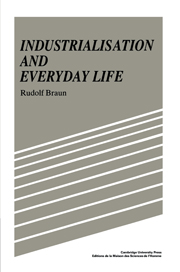Book contents
- Frontmatter
- Contents
- Prefaces
- Acknowledgements
- Note on measures and coinage
- Introduction
- 1 The preconditions for industrialisation
- 2 Changes to the structure of family and population in the industrial regions
- 3 Life and society of the population engaged in industry
- 4 The impact of industrialisation on the house and the rural economy
- 5 Work in the putting-out industry and its effect on the life of the common people
- 6 The outworkers' attitude to poverty and crises
- 7 Conclusion
- Postscript
- Appendix: a note on the administrative structure and social stratification in the countryside of Zurich during the Ancien Régime
- Notes
- Sources and bibliography
- Index
5 - Work in the putting-out industry and its effect on the life of the common people
Published online by Cambridge University Press: 16 March 2010
- Frontmatter
- Contents
- Prefaces
- Acknowledgements
- Note on measures and coinage
- Introduction
- 1 The preconditions for industrialisation
- 2 Changes to the structure of family and population in the industrial regions
- 3 Life and society of the population engaged in industry
- 4 The impact of industrialisation on the house and the rural economy
- 5 Work in the putting-out industry and its effect on the life of the common people
- 6 The outworkers' attitude to poverty and crises
- 7 Conclusion
- Postscript
- Appendix: a note on the administrative structure and social stratification in the countryside of Zurich during the Ancien Régime
- Notes
- Sources and bibliography
- Index
Summary
In the previous chapters we attempted to identify and interpret the changes to the life of the common people and to popular culture under the influence of the putting-out industry. In this chapter we tackle the question of how the nature of work in the putting-out industry can be related to these changes.
We must begin by setting a limit: many aspects of fundamental importance to the nature of work in the putting-out industry will not be discussed in this part of our investigation. They are reserved for Part two, where they will be set against and compared to factory work. What is more, we have not provided technical descriptions of the work processes and have included only as much information about the organisation and structure of the Zurich putting-out industry as is required for our line of enquiry.
Let us begin with a fundamental precondition for work in the putting-out industry in the seventeenth and eighteenth centuries – the Protestant work ethic.
In the ‘Description of the Poor in the Whole Countryside of Zurich’ (‘Beschreybung der Armen uff der ganzen Landschaft Zürich’), each petitioner's entitlement to alms was vouched for with this endlessly recurring phrase ‘Can indeed pray and spin’ (Kann wohl bätten und spinnen) – a formula which summarises the ecclesiastical authorities' ethos of a righteous life.
Max Weber has demonstrated the connections between the spirit of Protestantism and Puritanism and the capitalist economic system.
- Type
- Chapter
- Information
- Industrialisation and Everyday Life , pp. 131 - 153Publisher: Cambridge University PressPrint publication year: 1990



